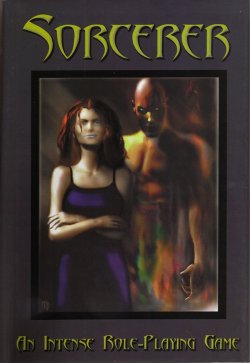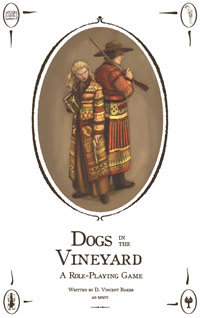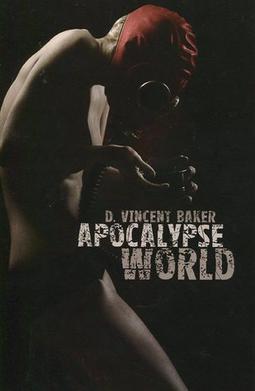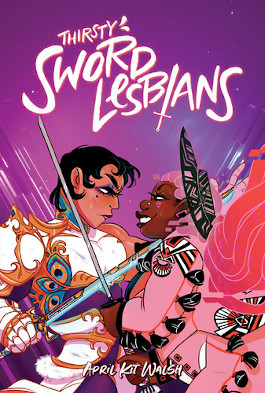
Fudge is a generic role-playing game system for use in freeform role-playing games. The name "FUDGE" was once an acronym for Freeform Universal DonatedGaming Engine and, though the acronym has since been dropped, that phrase remains a good summation of the game's design goals. Fudge has been nominated for an Origins Award for Best Role-Playing Game System for the Deryni Adventure Game.

Universalis, subtitled "The Game of Unlimited Stories", is a role-playing game (RPG) published by Ramshead Publishing in 2002 that stresses interactive storytelling. The game uses a unique system, based on "coins" that are used to make additions to the game, which allows the entire group to participate in the creation of the setting and events in play without a traditional gamemaster. The rules also provide a means of negotiating their own alteration, allowing for unlimited customization for play. The system is meant to support any possible genre.

Sorcerer is an occult-themed indie role-playing game written by Ron Edwards and published through Adept Press. The game focuses on sorcerers who summon, bind, and interact with demons, powerful non-human entities who work with and against the sorcerer.

Fate is a generic role-playing game system based on the Fudge gaming system. It has no fixed setting, traits, or genre and is customizable. It is designed to offer minimal obstruction to role-playing by assuming players want to make fewer dice rolls.

Dogs in the Vineyard is an independently published role-playing game published by Lumpley Games in 2004 that is loosely based on the history of the Mormons.

An indie role-playing game is a role-playing game published by individuals or small press publishers, in contrast to games published by large corporations. Indie tabletop role-playing game designers participate in various game distribution networks, development communities, and gaming conventions, both in person and online. Indie game designer committees grant annual awards for excellence.

The Pathfinder Roleplaying Game is a fantasy role-playing game (RPG) that was published in 2009 by Paizo Publishing. The first edition extends and modifies the System Reference Document (SRD) based on the revised 3rd edition Dungeons & Dragons (D&D) published by Wizards of the Coast under the Open Game License (OGL) and is intended to be backward-compatible with that edition.

A tabletop role-playing game, also known as a pen-and-paper role-playing game, is a classification for a role-playing game (RPG) in which the participants describe their characters' actions through speech and sometimes movements. Participants determine the actions of their characters based on their characterization, and the actions succeed or fail according to a set formal system of rules and guidelines, usually involving randomization. Within the rules, players have the freedom to improvise, and their choices shape the direction and outcome of the game.

Fiasco is a role-playing game by Jason Morningstar, independently published by Bully Pulpit Games. It is marketed as a "GM-less game for 3–5 players, designed to be played in a few hours with six-sided dice and no preparation". It is billed as "A game of powerful ambition and poor impulse control" and "inspired by cinematic tales of small time capers gone disastrously wrong—films like Blood Simple, Fargo, The Way of the Gun, Burn After Reading, and A Simple Plan."
David Vincent Baker is a designer and theorist of tabletop role-playing games and the owner of indie role-playing games publisher Lumpley Games, which also hosts the archives of The Forge. He and his wife Meguey Baker designed Apocalypse World, the first game in the Powered by the Apocalypse system. Apocalypse World won Game of the Year, Best Support, and Most Innovative game at the 2010 Indie RPG Awards, and was 2011 RPG of the Year at both the Golden Geek Awards and Lucca Comics & Games. Baker also designed Dogs in the Vineyard, which won the 2004 Indie RPG Game of the Year and Innovation Award and was one of three games shortlisted for the 2004 Diana Jones Award.

Apocalypse World is a post-apocalyptic indie role-playing game by D. Vincent Baker and Meguey Baker, published in 2010 with only an implied setting that is fleshed out by the players in the course of character creation. It was the game for which the Powered by the Apocalypse engine was developed. On release, Apocalypse World won the 2010 Indie RPG Award and 2011 Golden Geek RPG of the year.

Dungeon World is a tabletop fantasy roleplaying game created by Sage LaTorra and Adam Koebel. The game uses the Powered by the Apocalypse engine originally designed for Apocalypse World and used in Monsterhearts and other games. The game is advertised as having old school style with modern rules. The text of the game was released under the Creative Commons Attribution 3.0 Unported License.

Powered by the Apocalypse (PbtA) is a tabletop role-playing game design framework developed by Meguey Baker and Vincent Baker for the 2010 game Apocalypse World and later adapted for hundreds of other indie role-playing games.

13th Age is a d20 fantasy role-playing game designed by Rob Heinsoo and Jonathan Tweet, and published by Pelgrane Press. 13th Age has been well supported with over 25 supplements published since its 2013 release, the most recent in 2022.
Meguey Baker is a tabletop role-playing game designer, independent publisher and quilt historian. She and her husband Vincent Baker designed Apocalypse World, the first game in the Powered by the Apocalypse system.

Emily Care Boss is an indie roleplaying game designer, theorist and publisher. She was a foundational member of The Forge, an early leader in the indie role-playing game movement and is considered the creator of the American Freeform genre of roleplaying games, which combine indie RPG principles and mechanics with Nordic freeform and American chamber live action role-playing techniques. She has been referred to as the "Dean" of the North American school of structured freeform game design.

The Smallville Roleplaying Game is a superhero-themed role-playing game published in 2010 by Margaret Weis Productions, set in the universe of the television series Smallville.

Thirsty Sword Lesbians is a narrative-focused tabletop role-playing game that emphasizes telling "melodramatic and queer stories". The game was funded via a 2020 Kickstarter campaign and published by Evil Hat Productions in 2021. It uses a modification of the Powered by the Apocalypse game system.
Avery Alder is a Canadian tabletop role-playing game designer. She designs games with themes of LGBTQ self-discovery, community building, and post-apocalyptic survival. In collaboration with Benjamin Rosenbaum, Alder invented the Belonging Outside Belonging system, which became a template for future designers' games. Her work is a topic of scholarship in the history of game design.
Sleepaway is a horror indie role-playing game by Jay Dragon about teenage counselors at a summer camp trying to protect misfit campers from a monster called the Lindworm that takes on the form of its victims. It has themes of trauma, LGBTQ community support, and non-binary gender exploration. Sleepaway was inspired by slasher films and the Belonging Outside Belonging game system by Avery Alder and Benjamin Rosenbaum.















